This article is more than 5 years old.
On Thursday, June 9th, we (Sarah Jeong, Kathy Shields, Meghan Webb) attended the Summer 2016 NC-LITe meeting at Duke University in the newly designed commons for Research, Technology and Collaboration– called The Edge. What Follows is a brief overview of this meeting and our take-aways!
In step with previous NC-LITe meetings, after some initial mingling and settling in, the group shared Campus Updates with information about recent and/or upcoming changes at each institution’s library. The meeting was well attended (approximately 20 attendees) and included representation from UNCG, Elon, NCSU, NCCU, Central Carolina Community College, UNCC, UNC-CH, East Carolina and Duke University libraries.
Next, the group broke out into small group facilitated discussions. Each attendee was able to select two discussion sessions that centered around the following topics:
Engagement Outside the Classroom (Meghan)
It was wonderful to hear all of the creative ways that our neighboring institutions are promoting library resources and services through outreach efforts. Some ideas that stuck with me include:
- “pop-up library instruction” or “pop-up exhibits”: attempts to market research services and/or special collections materials through a more informal set-up in a public, more heavily-used space in the library (or even outside the library). I really like the idea of “pop-up library instruction” outside of the library/classroom. It could offer an opportunity to reach underserved students or students that are less aware of resources/services available to them. Just a matter of being in the right place at the right time.
- low maintenance book club: One librarian has had good results with introducing a low-maintenance book club for undergraduate students, faculty and staff. They have experimented with various selections (short story collections, various titles selected around a similar theme or discipline, etc.)
- digital outreach efforts: A few of the librarians were working with campus populations that are more commuter-based and have to design methods of engaging these patrons in an online environment. They are working to develop and improve upon online portals to encourage engagement with their community members.
- walking club: an attempt to build community, network with campus affiliates, and promote health and wellbeing– one librarian shared her efforts to develop a walking club with planned routes around campus. She used this time to informally check-in with campus walkers and share library resources.
Assessment (Sarah)
Emily Daly (Duke) led a discussion of assessment of library instruction sessions. At some universities, it is up to each individual librarian to assess their library instruction. Some librarians refer to the Claremont Colleges Library’s “Start Your Research” Tutorial Quiz for pre-class instruction. Some librarians use the “3-2-1 Assessment” approach as a Qualtrics survey associated with a course:
- What are three things you learned?
- What are two things you still don’t understand?
- What is one thing you’ll do differently when you research? (Alternatively, some librarians assess the affective learning domain by asking: How do you feel at the end of this class?)
If students would like to ask questions privately, ask them to write their email address.
Curriculum-mapping (Kathy)
Hannah Rozear (Duke) shared a curriculum map that she created for her liaison department, Global Health. She was inspired by the curriculum maps that Char Booth and the Claremont Colleges libraries created and have made available through their institutional repository. Curriculum maps have numerous benefits, including helping to visualize connections between courses and research initiatives, to identify opportunities for outreach, and identify shared goals between the curriculum and library instruction. As a new liaison, I am really interested in how they can help me gain a better understanding of my departments. Hannah used Mindomo to create her map and had to purchase a pro account (although a free program called LucidChart was suggested as an alternative). She used the course catalog, departmental websites, and course syllabi to gather the content for her map. What I thought was really interesting was that she also added clubs and organizations that were related to the major, as well as research labs, initiatives, and other projects, as these are all potential targets for outreach. Hannah recognized that this wasn’t a giant checklist – there was no way you could provide outreach to every single group or course, but what it did do what help her see the areas where she could have the greatest impact. Hannah will hopefully share the map she created, but in the meantime you can take a look at the Claremont Colleges maps I’ve linked above for more info.
Critical Pedagogy (Kathy/Sarah)
Kelly Wooten (Duke) led a discussion of critical and feminist pedagogies for librarians. Our group was small (just 3 total) so we mainly discussed why were interested in it, what we had already done, and what we were hoping to do with #critlib. Kelly showed us how to make zines and shared some zines that she had created (Sarah and I grabbed the ones on Beyonce and Taylor Swift, if you want to see them). Zine creation is a fun activity to start off an instruction session and students get to take something with them that isn’t a traditional handout but still gets the message across. Kelly works in Special Collections, and she shared some ideas for how to get students engaged in using primary sources in a more critical way, which I’m hoping to incorporate in LIB210 this fall!
Support of New Literacies (Meghan)
Kim Duckett (Duke) led this small group discussion and participants shared a wide-range of instructional content areas/literacy needs related to library instruction. Common literacies discussed included:
- digital content literacy: knowledge and appropriate use of digital content, including open access, open-education materials, and how to use media effectively in the classroom.
- intersections of scholarly communication and information literacy.
- project management: we discussed the observations of students, even graduate students, sometimes struggling with team-based projects or working together in research teams.
After the small group facilitated discussions, attendees were led on a tour of the Duke Library teaching and learning spaces (a full layout and more detail about the space can be found on the Duke University Libraries site):
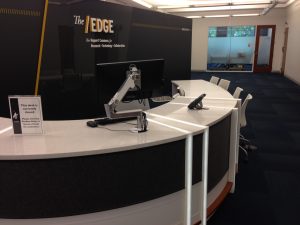
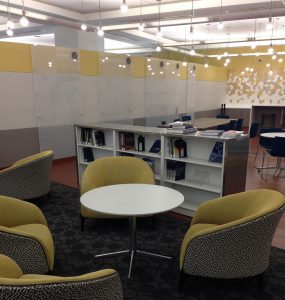
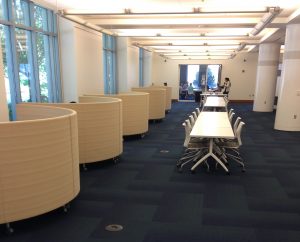
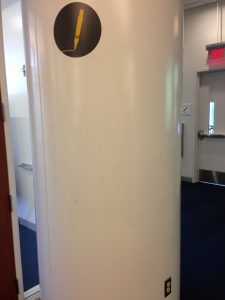
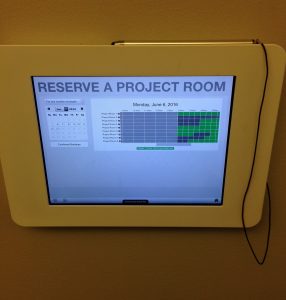
Lightning Talks: What We Can Learn from Our Failures
After the tour, a Lightning Talk session on the F word (that’s right: failure) was held and colleagues had opportunities to share the shame *and lessons learned* from a teaching sessions, outreach events, technology demos or other work events gone awry. Here are some quick take-away lessons from these shared stories:
- Communication matters and feedback transforms.
- Students need to know WHY – context matters!
- Good to plan for students’ individual differences.
- It’s okay to let go of a project that’s not working out. (And learning from the mistakes makes it worthwhile!)
- Every project needs a champion! Technology can’t solve every problem– owners/stakeholders need to care if a project is to succeed.

2 Comments on ‘NC-LITe Round-Up’
So sad I missed this! Glad y’all got to see The Edge. Sounds like an awesome space and an awesome meeting!
Sounds like a great collaborative meeting – conferences can be so much information sharing with little time for discussion. Love the idea of walking and low-maintenance book clubs as outreach opportunities. And I’ve had pop-up SCA exhibits on my mind for a while 🙂